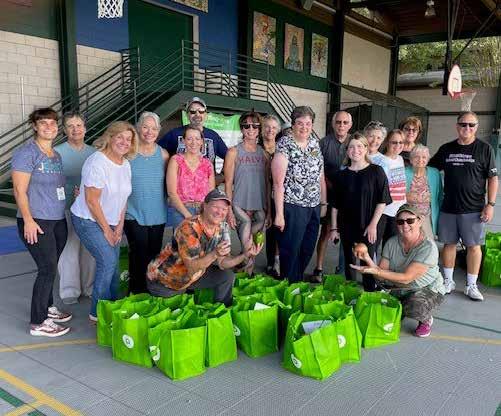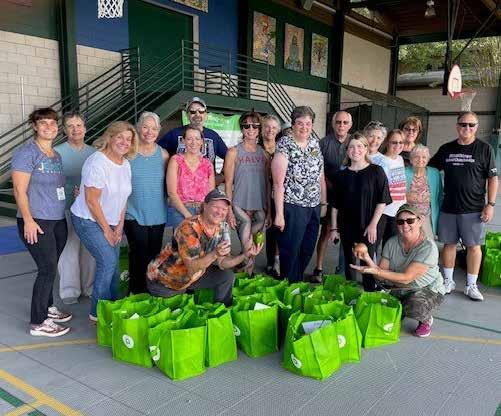
4 minute read
Sukkot: A Reminder That We Were Once Refugees
November 2023
by Amy Lefkof
Afghanistan, Belarus, Bhutan, Bulgaria, Burma, Cambodia, Central African Republic, Democratic Republic of Congo, Eritrea, Guatemala, Honduras, Iran, Iraq, Jordan, Malaysia, Moldova, Nepal, Nigeria, Pakistan, Somalia, Sri Lanka, Sudan, Syria, Thailand, Ukraine, Venezuela, Vietnam, Zambia, Zimbabwe. Refugees from these 29 countries
of origin received the 150 totes full of fresh vegetables, fruits, and kitchen staples assembled by 22 members of the Jewish Community Refugee Initiative (JCRI) on October 3 as part of JCRI’s 4th Annual Drive Through Sukkah for Refugees, undertaken in partnership with Refugee Support Services (RSS), a nonprofit post-resettlement organization that helps newly arrived refugees make Charlotte their new home.
Temple Beth El’s Associate Rabbi Lexi Erdheim joined the volunteers at the Poliakoff Athletic Pavilion and connected the harvest holiday of Sukkot to the Drive Through Sukkah for Refugees, noting how food insecurity in some communities compels those of us who have an abundance to share our bounty.
JCRI co-chair Elizabeth Weinstein praised community partners that contributed to the success of the program: “Publix once again donated the reusable totes and Amelie’s Bakery generously donated a loaf of sourdough bread for each refugee family. The logistical help from Emily Russell, Butterfly Project administrator at the Levine Jewish Community Center was invaluable.” Ruth Pordes and Maddy Baer served as JCRI’s head buyers for fruits and vegetables. Other volunteers, such as Jackie Fishman from Temple Beth El and Heidi Rotberg from Temple Israel, served on the assembly line, bought and schlepped supplies, drove carloads of filled totes to RSS, or made a monetary contribution to JCRI.
Refugee Support Services
This year RSS has worked directly alongside 940 program participants from 30 countries of origin, enlisted 191 volunteers, and its staff numbers 14. RSS onboards volunteers on a rolling basis a couple of times a month and volunteer needs shift as needs in the community shift. RSS is recruiting more volunteers for its Fruitful Friends program to be matched in one-to-one friendships with program participants as well as volunteers for their Help Desk program to assist with things like community navigation and ESL enrollment. Anyone interested in volunteering can find more information about the process and fill out a volunteer application at www.refugeesupportservices. org/get-involved/volunteer-application-process/
Carolina Refugee Resettlement Agency
JCRI also partners with the Carolina Refugee Resettlement Agency (CRRA), the local affiliate of HIAS (Hebrew Immigrant Aid Society), one of 10 primarily faith-based organizations partnering with the federal government to help refugees start their lives in safety in the United States. CRRA has had a strong year supporting refugees and parolees from more than 15 different countries. In the past year, the agency has served 300 new refugee arrivals, 280 Ukrainian parolees and assisted many Cuban/Haitian parolees. Parole is a discretionary grant of temporary permission to enter the United States for urgent humanitarian reasons. Catholic Charities Diocese of Charlotte, the other resettlement organization in Charlotte, resettled 250 refugees this calendar year to date, and served over 300 Afghan, Ukrainian, and Cuban Parolees.
Interested in volunteering with newly resettled refugees? Community volunteers are always needed by CRRA for refugee appointment transportation needs, apartment set-ups and assisting with cultural orientation and financial literacy classes. CRRA always welcomes gently used furniture and household items as well as cleaning supplies, toiletries, and winter coats. CRRA’s volunteer and donation coordinator can be contacted at: Annsley.banks@carolinarefugee.org
Catholic Charities’ biggest donation needs are winter coats, furnishings (new and used), and gift cards for food and home supplies.
We, too, have been refugees
Welcoming the stranger is a core principle of Judaism as the Torah instructs us 36 times to care for the stranger. Unfortunately, in 2023, resettlement is possible for less than one percent of the 110 million people worldwide who have been forced to flee their homelands due to persecution based on their race, religion, nationality, political opinion, gender, or sexual orientation.
Historically, the United States has been among the world’s leaders in refugee resettlement. Since the passage of the Refugee Act in 1980 (which passed by a unanimous vote in the Senate and strong bipartisan support in the House), the United States has admitted over three million refugees. Recently, on September 29, 2023, President Biden signed the Presidential Determination on Refugee Admissions for Fiscal Year 2024, setting the refugee admissions target (the refugee ceiling) at 125,000 for this upcoming fiscal year.
The holiday of Sukkot is a reminder that our people have lived in temporary fragile shelters — during biblical harvests and during our 40-year migration after our exodus from Egypt. We, too, have been refugees.












